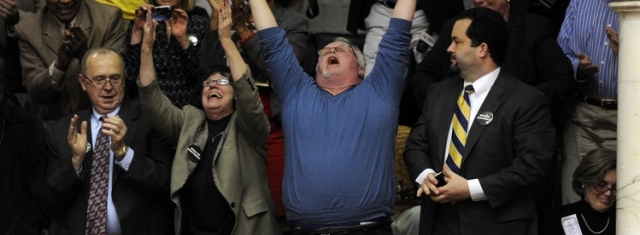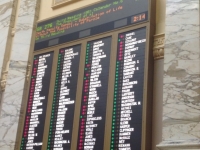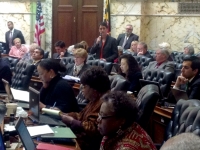News
Death Penalty Repeal clears Maryland General Assembly
Awaiting Governors Signature

Vicki Schieber and Kirk Bloodsworth celebrate! (Source: Baltimore Sun)
USPA NEWS -
By a vote of 82-to-56, the Maryland House of Delegates approved SB 276, a measure repealing the death penalty, on Friday and sent the bill to Governor Martin O´Malley, who has long supported banning capihtal punishment.
The state Senate voted 27-to-20 late last week in support of the legislation.
The state Senate voted 27-to-20 late last week in support of the legislation.
Maryland's Kirk Bloodsworth, the first death row inmate in the nation to be exhonerated by DNA evidence, celebrated Friday's historic vote with Sylvester and Vicki Schieber, whose daughter Shannon was brutally murdered, and NAACP President Ben Jealous in the House gallery just above Speaker Mike Busch (D-30-Annapolis).
Bloodsworth, a Marylander and former Marine, was ultimately exonerated by DNA evidence in 1993 for the brutal rape and murder of nine-year-old Dawn Hamilton.
He had been sentenced to death in Baltimore County in 1985.
Bloodsworth, a Marylander and former Marine, was ultimately exonerated by DNA evidence in 1993 for the brutal rape and murder of nine-year-old Dawn Hamilton.
He had been sentenced to death in Baltimore County in 1985.
Ironically, at one point while in prison, Bloodsworth occupied a cell directly above Kimberly Shay Ruffner, who was serving a sentence for another rape, and who would ultimately be linked by DNA evidence to the rape and murder of Dawn Hamilton.
The evidence that originally convicted Bloodsworth was the testimony of five witnesses who placed him either with the victim or near the scene of the crime. In addition, the prosecution introduced evidence purporting to link a pair of his shoes to marks on the victim's body.
In 1986, the Court of Appeals overturned Bloodsworth's conviction, finding that the prosecution had illegally withheld potentially exculpatory evidence from the defense.
The evidence that originally convicted Bloodsworth was the testimony of five witnesses who placed him either with the victim or near the scene of the crime. In addition, the prosecution introduced evidence purporting to link a pair of his shoes to marks on the victim's body.
In 1986, the Court of Appeals overturned Bloodsworth's conviction, finding that the prosecution had illegally withheld potentially exculpatory evidence from the defense.
He was re-tried, again convicted, and sentenced to two consecutive life terms in prison.
Yes, Bloodsworth, an innocent man, spent nine years in prison, two of which were on death row, for a rape and murder he did not commit.
"To govern is to choose, and at a time where we understand the things that actually work to reduce violent crime, when we understand how lives can be saved, we have a moral responsibility to do more of the things that work to save lives," O'Malley said at a press conference.
"We also have a moral responsibility to stop doing the things that are wasteful, and that are expensive, and do not work, and do not save lives, and that I would argue run contrary to the deeper principles that unite us as Marylanders, ..."
Yes, Bloodsworth, an innocent man, spent nine years in prison, two of which were on death row, for a rape and murder he did not commit.
"To govern is to choose, and at a time where we understand the things that actually work to reduce violent crime, when we understand how lives can be saved, we have a moral responsibility to do more of the things that work to save lives," O'Malley said at a press conference.
"We also have a moral responsibility to stop doing the things that are wasteful, and that are expensive, and do not work, and do not save lives, and that I would argue run contrary to the deeper principles that unite us as Marylanders, ..."
Opponents of the Death Penalty Repeal Bill
Opponents insisted capital punishment was necessary in punishing those who commit the most egregious crimes.Baltimore County state attorney Scott Shellenberger, a prominent opponent of the bill, said eliminating capital punishment was unnecessary, since Maryland's current policy is judicious and one of the "most restrictive in the country."
Since a 2009 law making the death penalty more restrictive, a judge can only impose a sentence of death in Maryland when one of three factors exists: DNA evidence, a videotaped confession or a videotaped murder.
With one of the strictest death penalty laws in the country, Maryland has only put five people to death since 1978. The last person put to death was in 2005 by Republican Governor Ehrlich.
Delegate Neil Parrott (R-Washington County), said most state residents don't want to see the death penalty abolished, but the governor and the "Annapolis eite" used political arm-twisting to push the bill through the legislature.
Parrott said the death penalty move "does open a door" to petition, or challenge, such a law and bring it up for a referendum. Parrott has set up mdpetitions.com, a website devoted to pursuing petitions targeting laws "passed by a liberal-leaning legislature in Annapolis that simply do not make sense."
Parrott says it's too early to say how opponents of the ban will proceed when the bill is signed. He said it's "excruciatingly difficult" to petition an issue to Referrendum, but we will re-evaluate after session.
Parrott said the death penalty move "does open a door" to petition, or challenge, such a law and bring it up for a referendum. Parrott has set up mdpetitions.com, a website devoted to pursuing petitions targeting laws "passed by a liberal-leaning legislature in Annapolis that simply do not make sense."
Parrott says it's too early to say how opponents of the ban will proceed when the bill is signed. He said it's "excruciatingly difficult" to petition an issue to Referrendum, but we will re-evaluate after session.
"The death penalty is not a deterrent. It is justice," said Del. C.T. Wilson, a former prosecutor and a Charles County Democrat. "I've seen the worst of the worst. It is necessary."
“˜“˜This bill is wrong-spirited,´´ said Delegate Michael McDermott, an Eastern Shore Republican. “˜“˜It´s a shame that we will not allow future generations to have the option of putting the absolute worst of the worst to death.´´
Del. Ted Sophocleus, an Anne Arundel County Democrat, recalled mopping up blood from a murder in his drugstore in the 1980s. He said he would not regret keeping the death penalty for heartless killers. "You're not going to make me feel guilty for pulling that switch."
“˜“˜This bill is wrong-spirited,´´ said Delegate Michael McDermott, an Eastern Shore Republican. “˜“˜It´s a shame that we will not allow future generations to have the option of putting the absolute worst of the worst to death.´´
Del. Ted Sophocleus, an Anne Arundel County Democrat, recalled mopping up blood from a murder in his drugstore in the 1980s. He said he would not regret keeping the death penalty for heartless killers. "You're not going to make me feel guilty for pulling that switch."
Supporters of the Death Penalty Repeal Bill
"We're a better state for ending it," said Del. Sandy Rosenberg, a Democrat from Baltimore who has long pushed for repeal.Delegates spoke of religion, morality and personal loss, as well as grisly murders from Maryland's recent past, in variously trying to persuade colleagues to repeal Maryland's death penalty law.
Delegate Alonzo Washington, a Democrat from Prince Georges County and co-sponsor of the repeal bill in the house said "the death penalty disproportionately affects African Americans." Delegate Washington went on say that "sentencing someone to death and sentencing them to life in prison without the possibility of parole is equivalent to me." "I do not support the death penalty, period," The freshman Delegate said.
Delegate Jon Cardin, a Democrat from Baltimore County said that for all the death penalty provides in terms of deterrence and leverage, it is simply not worth it. "The bang is not worth the buck."
"There are good moral, ethical, and policy arguments to have this debate go either way," Cardin said.
Speaking from a big picture perspective, Delegate Cardin said "we as a society, and this body (Md. General Assembly) as a budgetary force must weigh on the side of the moral high ground, as well as budgetary constraint." "It costs three times as much to keep someone on death row, as it does to keep them for a sentence of life in prison with no possibility of parole," Cardin said.
"There are good moral, ethical, and policy arguments to have this debate go either way," Cardin said.
Speaking from a big picture perspective, Delegate Cardin said "we as a society, and this body (Md. General Assembly) as a budgetary force must weigh on the side of the moral high ground, as well as budgetary constraint." "It costs three times as much to keep someone on death row, as it does to keep them for a sentence of life in prison with no possibility of parole," Cardin said.
Governor Martin O'Malley says he expects to sign the bill into law after the general assembly concludes its 90 day legislative session in Annapolis.
The only thing that remains unknown is the fate of the 5 men who sit on Maryland's death row. Governor O'Malley has not made any statement on whether he will commute their sentence to life in prison without the possibility of parole or leave them on death row. Either way, it is 100% his decision to ultimately make as Governor.
Video of legislators on both sides of the issue after the historic vote in the Maryland House of Delegates: http://youtu.be/-usw4vPQups
The only thing that remains unknown is the fate of the 5 men who sit on Maryland's death row. Governor O'Malley has not made any statement on whether he will commute their sentence to life in prison without the possibility of parole or leave them on death row. Either way, it is 100% his decision to ultimately make as Governor.
Video of legislators on both sides of the issue after the historic vote in the Maryland House of Delegates: http://youtu.be/-usw4vPQups
Maryland Death Penalty Repeal Capital Punishment Kirk Bloodsworth Dna Evidence Lethal Injection Governor Omalley Naacp Delegate Alonzo Washington Delegate Jon Cardin Death Murder Omalley Maryland Governor Governor Execution Death
Liability for this article lies with the author, who also holds the copyright. Editorial content from USPA may be quoted on other websites as long as the quote comprises no more than 5% of the entire text, is marked as such and the source is named (via hyperlink).








